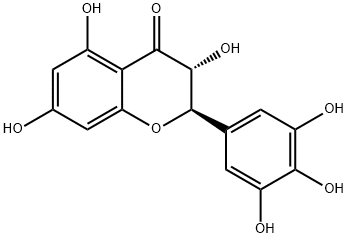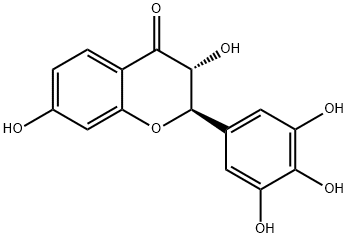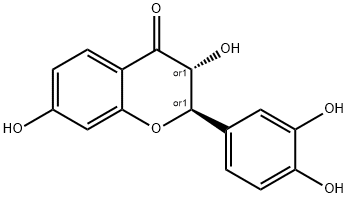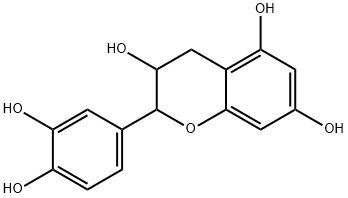Dihydromyricetin , >97.0%(HPLC) , 27200-12-0
CAS NO.:27200-12-0
Empirical Formula: C15H12O8
Molecular Weight: 320.25
MDL number: MFCD00189451
EINECS: 200-001-8
| Pack Size | Price | Stock | Quantity |
| 250mg | RMB39.20 | In Stock |
|
| 1G | RMB55.20 | In Stock |
|
| 5g | RMB119.20 | In Stock |
|
| 25g | RMB551.20 | In Stock |
|
| 50g | RMB879.20 | In Stock |
|
| 100g | RMB1519.20 | In Stock |
|
| others | Enquire |
PRODUCT Properties
| storage temp. | -20°C |
| solubility | DMSO: ≥5mg/mL (warmed) |
| form | powder |
| Boiling point: | 780.7±60.0 °C(Predicted) |
| Density | 1.808±0.06 g/cm3(Predicted) |
| Melting point: | 239-241 °C |
| pka | 7.38±0.60(Predicted) |
| color | white to beige |
| Stability: | Hygroscopic |
| InChI | InChI=1S/C15H12O8/c16-6-3-7(17)11-10(4-6)23-15(14(22)13(11)21)5-1-8(18)12(20)9(19)2-5/h1-4,14-20,22H/t14-,15+/m0/s1 |
| InChIKey | KJXSIXMJHKAJOD-LSDHHAIUSA-N |
| SMILES | [C@H]1(C2=CC(O)=C(O)C(O)=C2)OC2=CC(O)=CC(O)=C2C(=O)[C@@H]1O |
| LogP | 1.230 (est) |
| CAS DataBase Reference | 27200-12-0 |
Description and Uses
Dihydromyricetin (DHM), also known as ampelopsin, is a natural flavonoid compound, which is found in large quantities in Asian plant species. One of them – Hovenia dulcis – is known for centuries in traditional Chinese medicine as a cure for alcohol poisoning and hangover (Liang et al. 2014). DHM is sold as a supplement and is commonly marketed as a treatment for hangovers due to its ability to reduce blood alcohol levels and projected hepatoprotective properties.
Dihydromyricetin had beneficial effects on health such as antimicrobial, anti-inflammatory,antioxidative, anticancer, lipid and glucose metabolism-regulatory activities,and cell death-mediating without or with minimum adverse effects on normal cells. And most importantly, DHM has been shown to provide significant hepatoprotective effects. Its positive influence on alcohol-induced and other liver diseases was suggested in the study of acute liver failure (Liu et al. 2017).
Dihydromyricetin has been used to study its effect on adipogenesis and glucose uptake in differentiated 3T3-L1 pre-adipocytes. It has also been used to study its antitumor activity against liver cancer cells.
Safety
| Safety Statements | 24/25 |
| WGK Germany | 3 |
| HS Code | 29329990 |




